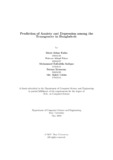| dc.contributor.advisor | Alam, Md. Golam Rabiul | |
| dc.contributor.author | Easha, Ishrat Jahan | |
| dc.contributor.author | Faiza, Fairooz Afnad | |
| dc.contributor.author | Sadique, Mohammad Rafiuddin | |
| dc.contributor.author | Tabassum, Fatima | |
| dc.contributor.author | Uddin, Md. Rakib | |
| dc.date.accessioned | 2023-05-23T05:49:09Z | |
| dc.date.available | 2023-05-23T05:49:09Z | |
| dc.date.copyright | 2022 | |
| dc.date.issued | 2022-05 | |
| dc.identifier.other | ID 18101356 | |
| dc.identifier.other | ID 18101367 | |
| dc.identifier.other | ID 17201011 | |
| dc.identifier.other | ID 18101439 | |
| dc.identifier.other | ID 17101254 | |
| dc.identifier.uri | http://hdl.handle.net/10361/18310 | |
| dc.description | This thesis is submitted in partial fulfillment of the requirements for the degree of Bachelor of Science in Computer Science, 2022. | en_US |
| dc.description | Cataloged from PDF version of thesis. | |
| dc.description | Includes bibliographical references (pages 28-29). | |
| dc.description.abstract | Today, mental health is as important as safety. It affects people directly and indirectly.
Transgender people with mental health issues are often overlooked and in our
nation, especially transgender women, suffer from anxiety, depression, and suicide.
This research examines depression and anxiety prediction. Classification models
and NLP are used to detect depression and anxiety in 41 Bangladeshi transgender
people. The data came from sociodemographic, victimization, social support, interpersonal
functioning, depression, anxiety, and self-esteem questionnaires (RSE).
We predicted depression and anxiety in transgender people using culturally adapted
depression and anxiety scales and a hybrid questionnaire based on minority and
resilience. We conducted interviews, analyzed sentiment with TF-IDF, and constructed
classification algorithms. We extracted and validated questionnaire data
using median, SD, and Cronbach alpha. Correlation between two independent variables.
Chi-square and ANOVA examined transgender depression, anxiety, and age.
This link was validated using SVM, XGBoost, Naive Bayes, and Logistic Regression
where SVM and Naive Bayes had a better accuracy for depression which was 84.6%
and for anxiety SVM gave 76.9%. In the case of NLP linear SVC and Random
Forest gave the highest F1 score among others which were 92.30% and 76.92% respectively.
Using these methods, we determined that depression is comparatively
minimal whereas anxiety is severe. This association can be used to minimize the
severity of these mental health problems. | en_US |
| dc.description.statementofresponsibility | Ishrat Jahan Easha | |
| dc.description.statementofresponsibility | Fairooz Afnad Faiza | |
| dc.description.statementofresponsibility | Mohammad Rafiuddin Sadique | |
| dc.description.statementofresponsibility | Fatima Tabassum | |
| dc.description.statementofresponsibility | Md. Rakib Uddin | |
| dc.format.extent | 29 pages | |
| dc.language.iso | en | en_US |
| dc.publisher | Brac University | en_US |
| dc.rights | Brac University theses are protected by copyright. They may be viewed from this source for any purpose, but reproduction or distribution in any format is prohibited without written permission. | |
| dc.subject | Mental health | en_US |
| dc.subject | Transgender | en_US |
| dc.subject | NLP | en_US |
| dc.subject | Prediction | en_US |
| dc.subject | Anxiety | en_US |
| dc.subject | Depression | en_US |
| dc.subject.lcsh | Machine learning | |
| dc.title | Prediction of anxiety and depression among the transgender in Bangladesh | en_US |
| dc.type | Thesis | en_US |
| dc.contributor.department | Department of Computer Science and Engineering, Brac University | |
| dc.description.degree | B. Computer Science | |

